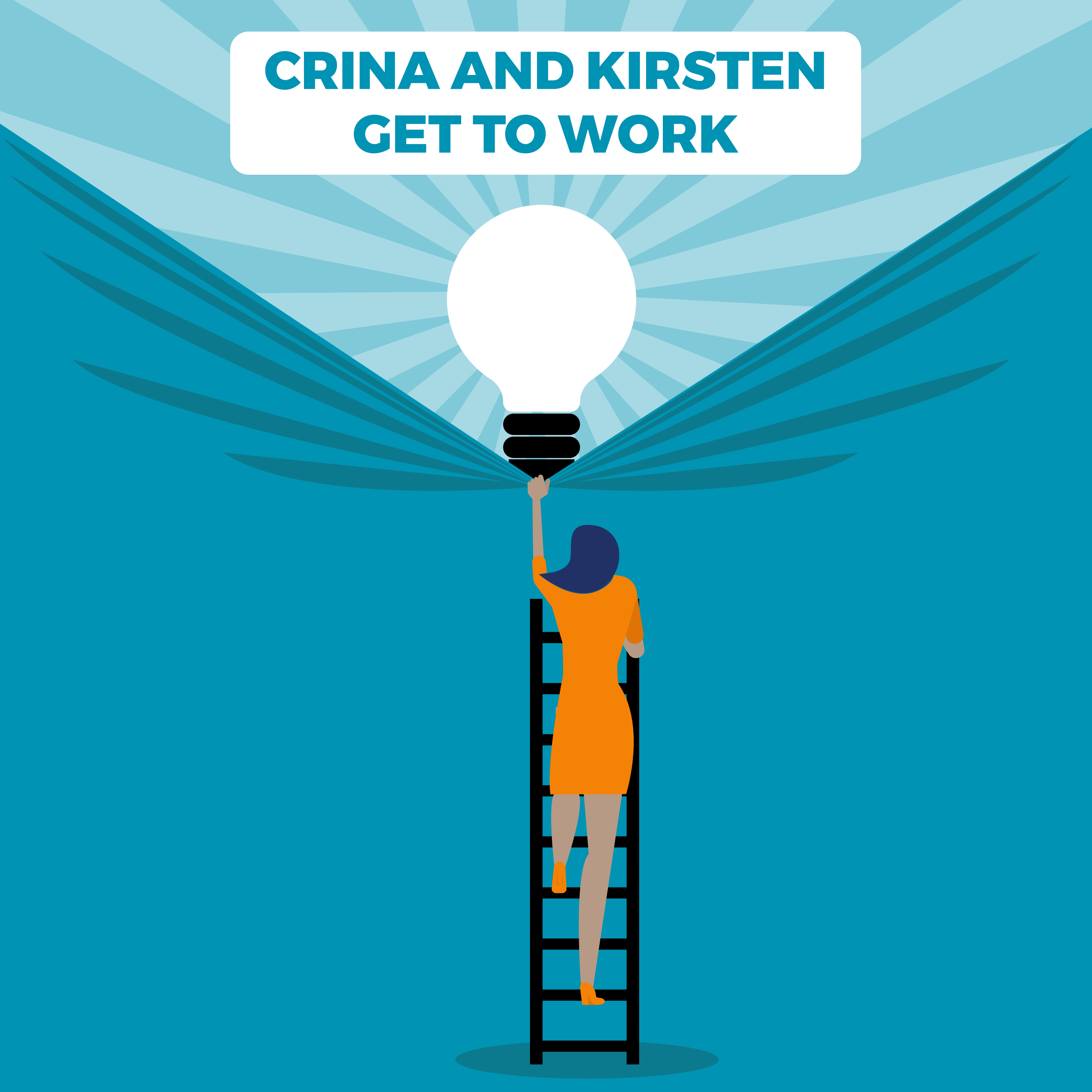Crina and Kirsten Get to Work

We have one single mission: Help women find ease, meaning and joy at work and in life. We use our experiences as business owners, entrepreneurs, mentors and inspirational leaders to explore topics that all working women care about: shitty bosses; smashing the patriarchy; balancing work and life; navigating change and getting what you want! We guarantee that you will be entertained and inspired... promise!
Episodes
Episodes



Friday May 24, 2024
Grit, Persistence and Discomfort: Tapping Into Your Hidden Potential
Friday May 24, 2024
Friday May 24, 2024
From embracing discomfort to seeking advice, Crina and Kirsten dive into Dr. Adam Grant’s new book on the science of achievement. Discover how grit and persistence can lead to mastery, no matter where you are in your journey.
SHOW NOTES
In this episode of Crina and Kirsten Get to Work our hosts discuss Adam Grant’s new book on the science of achievement. Ever thought about what you’d like to get better at? Crina wants to learn how to have more fun and Kirsten is still working on figuring out “no.” Sigh.
Mastery can start at any chapter of your life. Take Laura Ingalls Wilder, who penned her first success in her 60s, or Vera Wang, who leapt from ice skates to runway gowns. Julia Child didn’t publish her first cookbook until 50, and Phyllis Diller took up stand-up comedy at 37. Or consider Steve Martin who spent years doing the labor of writing his own jokes to get really good at it - he did not start out being good, he learned to be so very good.
Dr. Adam Grant argues in his new book Hidden Potential that those who might lack natural flair but possess the grit to persist, embrace discomfort, and seek advice often outpace the naturally gifted. Think about it: the kid on the soccer field who isn’t the fastest but keeps pushing might just outshine the rest with sheer willpower.
Society tends to glorify innate talent. First off, it is just fun to watch someone who is innately good at something. We may value innate talent because it gives us an easy out when we are not naturally good at something - we do not have to experience the discomfort of trying. And yet we know that real satisfaction comes from finding our way through the tough stuff. Child prodigies often find real-world challenges daunting precisely because they haven’t navigated the messier, less predictable paths of life. The dichotomy of talent and challenge is fundamental to understanding our hidden potential.
Grant suggests that we embrace the discomfort that signals we are learning, mix up our routine to keep things interesting, and engage in the dual dance of seeking and giving advice. And there is so much more in Hidden Potential so give it a read.



Friday May 10, 2024
The Power of Indifference: How Not Giving a #%X Can Improve Your Work Life
Friday May 10, 2024
Friday May 10, 2024
In this episode of Crina and Kirsten Get to Work, our “hosts with the most” discuss not giving a #%$X! Yes, friends, there are times when we should care less about work. Our precious mental, emotional and even spiritual energy are really better used on something else.
There is so much we can care about at work - what other people think, what other people do, outcomes we cannot control, what information we do not have - just so much and yet when is it really worth it to care?
Our duo starts with what is worth caring about:
Our personal relationships.
The responsibilities we agree to take on at work, in community, or with our family and friends.
Our professional/ personal development - being our best selves, which also includes really liking who we turn out to be.
Our financial security.
Our values and ethical and moral principles - living with integrity.
Work weaves its way through many of the things we care about. The challenge with work is that many of us tend to define ourselves by our work.
Harvard Business Review interviewed 700 employees and concluded that while passion at work is generally a good thing, too much passion leads to burnout and a little detachment goes a long way to creating a sustainable relationship with work, with reduced burnout, enhanced creativity, increased resilience, better focus and better decision making. Don’t Let Passion Lead to Burnout on Your Team (hbr.org)
So how to do we give less of a #%$X without getting ourselves into the #%$X?
Ask yourself why: Carefully consider why you care so deeply about something? Is it just about ego or is it really consistent with the list above (relationships you value, principles you hold dear . . .).
Ask yourself whether your response/involvement is really that important: Doing nothing can be perfectly appropriate; and remember most people care far less about what we do than we think.
Pur your job in context: A job is not the be all and end all of your life and if it is, that is a new issue to consider. For most of us a job funds our lives and those of the people we love.
Create boundaries between work life and personal life. Boundaries between work and personal are key to caring a little less when caring is overwhelming. Do you leave on time, do you check your emails all evening, do you cancel time with friends and family because of work emergencies? Creating stronger boundaries can help us create that work life balance, which may just need a little less caring.
And remember there are really always four responses to a situation:
Exit: remove yourself from the situation; do nothing; LET THEM
Voice: take action and try to improve the situation
Persistence: stay in, kind of grin and bear it
Neglect: stay but reduce effort
We have options in deciding how much we care. And we need to wisely use our caring energy.



Friday Apr 26, 2024
Good News--Positive News for Women at Work
Friday Apr 26, 2024
Friday Apr 26, 2024
Let’s have some good news about women at work. And what better place to look than in the news from all over the world.
In a great story out of Australia, we can all have a good chuckle about an art installation that excluded men and the legal challenge that ensued from a man who felt he was not getting his money’s worth because he could not access an exhibit only available to women. The Court disagreed with the man who filed the suit finding that he was experiencing exactly what the artist wanted him to experience - exclusion. Museum behind ladies-only art exhibit sued by man who was denied entry - National | Globalnews.ca
And here in the US, women are reentering the workforce at a record pace. This resurgence appears to be linked to women coming back to a more diverse set of industries and positions more women in leadership and the flexibility offered by hybrid work. 3 Reasons Women Are Reentering The Workforce At A Record Pace
In a study commissioned by the non-profit Girls Who Code and its Moms First campaign, Boston Consulting Group found that on-site childcare, close to site childcare, backup childcare and childcare stipends had impressive returns on investment - anywhere from 90% to 425% - all we can say is WOW! BCG Report, 2024 - Moms First
NPR reported on Icelandic women continuing their tradition of striking to create equity in pay for women and non-binary people. Women and nonbinary Icelanders go on a 24-hour strike to protest the gender pay gap
And last up - we know women have typically had to work harder than men for the same pay and recognition. This travesty does not apply to exercise. The Journal of the American College of Cardiology found that women get more benefits than men from the same amount of exercise.
And that is the good news, listeners.



Friday Apr 12, 2024
The Authentic Leader: Embracing Your Executive Presence as a Woman
Friday Apr 12, 2024
Friday Apr 12, 2024
On this episode of Crina and Kirsten Get to Work our hosts explore executive presence for women at work. Sylvia Ann Hewlett, an economist and the CEO of Hewlett Consulting Partners, said that executive presence is the difference between merit and success. We can sometimes cringe when we hear and talk about executive presence because it can feel like a call to be someone other than who we are - the requirement to fit into a mold to be a leader. No, say our hosts!! The new executive presence is about authenticity and inclusion.
Hewlett conducted surveys in 2012 and again in 2022 that tell a story of significant shifts in our view of executive presence. The New Rules of Executive Presence (hbr.org). Hewlett says, “[t]he old ideal—shaped and embodied by white male CEOs who ruled the U.S. and European corporate worlds through the beginning of this century—has long been eroding.”
Executive presence is made up of gravitas (think confidence and decisiveness); communication (think clear and direct) and appearance (think authenticity). In 2012, Hewett’s survey showed that having “a blue-chip” pedigree was important for gravitas, and that characteristic did not even make the list in 2022. In 2022, respect and inclusiveness were more important to executive presence than they were in 2012. Another shift was seen in the communication element of executive presence where in 2012 “forceful” was important and in 2022 “listening to learn” was important to executive presence. Even our view of executive presence as it relates to appearance has changed - while being polished is still important, authenticity has risen to one of the most important factors in the appearance component.
Executive presence is learnable - and you do not have to master all of the elements. Focusing on your authentic strengths can improve your executive presence. Hewlett’s work tells us two important things: 1. we can be our authentic selves and have executive presence; and 2. executive presence in the workplace is more inclusive than ever before.



Friday Mar 29, 2024
Micro Stress; It Might Be More Major Than You Think
Friday Mar 29, 2024
Friday Mar 29, 2024
Microstress differs from traditional stress in its subtlety and frequency. These small, often unnoticed stressors can accumulate and greatly impact our well-being, both mentally and physically. Join us as we uncover the hidden impacts of microstress and explore strategies to combat its effects for a healthier, more balanced life.
SHOW NOTES
While traditional stress arises from major life events, microstressors are small, often unnoticed, and yet they can accumulate and significantly affect our well-being. Microstress, unlike what we think of as more conventional stress, does not provoke the same physiological response as bigger stress - so our body is not working to protect us from stress in the same way. Microstressors can be categorized into three main types:
Draining our capacity to get things done: These microstressors often make us feel like we're failing at work and in our personal lives. Examples include misalignment with collaborators on roles or priorities, uncertainty about others' reliability, and an overwhelming number of tasks or responsibilities.
Draining our emotional reserves: These microstressors are caused by others and can leave us feeling emotionally depleted. Examples include feeling responsible for the success and well-being of others, confrontational conversations, and a lack of trust in our social network.
Challenging our identity: These microstressors can trigger feelings of discomfort, making us question if we're truly living in line with our values and goals. Examples include pressure to pursue goals that don't align with our personal values, attacks on our self-confidence or worth, and negative interactions with family or friends.
The effects of microstress extend beyond mental health, impacting physical well-being as well. It disrupts the body's ability to maintain internal balance, leading to issues like "brain fog," where cognitive function is impaired - and even affects our body’s ability to process food. Despite these challenges, there are strategies to mitigate the effects of microstress.
Pushing back against microstress in practical ways—such as learning to say no to small requests, managing technology to reduce interruptions, and readjusting relationships to prevent others from putting microstress on you—can be effective. Rising above these stressors, by keeping them in perspective and not letting them consume us, is another valuable approach.
Human connection emerges as a powerful tool in combating microstress. Engaging with others helps develop brain circuits that manage our reactions and emotions, alleviating the burden of stress. By cultivating diverse connections and engaging in meaningful activities, we can create a multidimensional life that buffers us against the effects of microstress.
Join us as we explore the world of microstress, uncovering its hidden impacts and discovering strategies to combat its effects. Learn how small changes in daily life can lead to significant improvements in overall well-being.



Friday Mar 15, 2024
Feeling Embarrassed? Make It Work For You!
Friday Mar 15, 2024
Friday Mar 15, 2024
Embarrassing yourself is the key to success - well, not exactly, but there are benefits to embarrassment. In this episode of Crina and Kirsten Get to Work, our hosts delve into this unusual emotion - embarrassment - hot head, panic, stomach upset, racing heart, sweating - and all of the things.
SHOW NOTES
Science tells us embarrassment is a unique emotion - unlike an emotion such as fear, we need to think before we can feel this emotion. Rowland Miller at Sam Houston University tells us, “we become embarrassed when we perceive that the social image we want to project has been undermined and that others are forming negative impressions of us.” But there is more to embarrassment.
John Sabini of the University of Pennsylvania and his colleagues found embarrassment is likely to arise when a person anticipates a disruption of smooth social interaction and/or faces a situation without clear social expectations . She is not worried about making a bad impression, but rather she does not know what to do next.
Sabini defined three kind of embarrassment:
Faux-pas - food in your teeth when meeting your new boss
center-of-attention - being the guest of honor at a surprise party
sticky-situation embarrassment - having to fire someone or give hard feedback
Crina adds a fourth type, vicarious embarrassment, to this list - the feeling of being embarrassed for others.
Embarrassment serves a few important purposes. Embarrassment signals others that we know we stepped in it and these negative feelings discourage us from doing it again and encourage us to make repairs with others. It can also encourage us to prepare for a situation to avoid being embarrassed.
Research published in the Journal of Personality and Social Psychology found people who expressed more outward signs of embarrassment while describing their embarrassing moments (such as tripping) also reported a tendency to be more "prosocial" — that is, kinder and more generous.
Researchers also found that when the study’s actor expressed embarrassment, study participants found the actor more trustworthy and wanted to affiliate with him more. Embarrassment can humanize a leader because it helps break down the barriers between team members and the leader and ultimately allows for stronger connections to form. Does the leader have some humor about her embarrassment or are they prickly and defensive about the embarrassment? A leader’s response to embarrassment can set the tone for the team.
When we think about how to respond to embarrassment, research suggests most people tend to overestimate how much others notice our embarrassment. We can help put embarrassment in context by detaching ourselves and thinking about how we would react as an observer of our embarrassing situation. It’s likely we will find grace, distance and context in that exercise.
We know embarrassment does not feel good, but it communicates we care and presents opportunities to consider our behavior and be more connected with those around us.
The Surprising Perks of Being Embarrassed
Oh no you didn't!
Journal of Personality and Social Psychology,
Countering embarrassment-avoidance by taking an observer's perspective | Motivation and Emotion



Friday Mar 01, 2024
Silence Isn't Always Golden: Why Women Don't Speak Up at Work
Friday Mar 01, 2024
Friday Mar 01, 2024
There are good reasons why women don’t speak up at work, but that silence is not serving us. When we communicate publicly, assertively and honestly for the rights and needs of ourselves and others, we’re shifting the power dynamics that have held us all back.
SHOW NOTES
First, we know that women are more likely to speak up for others than they are for themselves. We also know from the research that women are far more likely to be interrupted and talked over. A 2014 study by Harvard Business Review found that while men and women see this as a problem, men tend to attribute this to a woman’s failure to make their point in a strong, clear way - or getting rattled and allowing themself to be interrupted. Women tend to attribute this to feeling isolated and not liking conflict.
Our hosts delve deeper into what the research says about why and here is what they found:
Insinuation anxiety, which is the fear of insinuating distrust or disapproval of someone else.
Fear of embarrassment, need we say more?
Pluralistic ignorance, which is when we tend to sit around thinking someone else in the group will speak up - also known as the bystander effect.
When we do not speak up , we end up less of all the good things - physical and emotional well-being and more of what we do not want, stress and unhappiness.
There are some key times to speak up: when our boundaries are violated, when we notice someone is upset, when something goes against the rules, when we recognize danger and when no else does.
Dr. Sunita Sah at Cornell University suggests preparing to speak up can be helpful and asking for more time if you need it. Crina and Kirsten add, being clear, avoiding over-explaining, being compassionate and honoring your preferences.
The benefits of voicing your thoughts are high - more authenticity and more satisfaction. It is also critical that each of our very special and unique voices are heard.
MORE GOOD READS
Speak Up at Thanksgiving. Your Health Demands It
The Unavoidable Trap of Politeness: Why Is It So Hard to Just Say “No”? ‹ Literary Hub
Opinion: Why you find it so hard to resist taking bad advice - Los Angeles Times
Women, Find Your Voice (hbr.org)
Speaking Up for Yourself Is Important — 11 Steps to Get It Right
Why Is It So Hard to Speak Up at Work? - The New York Times
The Effect of Gender on Interruptions at Congressional Hearings | American Political Science Review | Cambridge Core



Friday Feb 16, 2024
Do Your Work With Love: It Might Just Love You Back
Friday Feb 16, 2024
Friday Feb 16, 2024
Love and work embrace as hosts Crina and Kirsten explore how to infuse our work with love. From expressing love through our tasks to cultivating a service mindset and practicing generosity, this episode serves up a recipe for success that's as fulfilling as it is rewarding. Let's bring more love into how we do our work!
SHOW NOTES
Crina and Kirsten dive into love and work, where Albert Brooks, Oprah Winfrey, Marcus Buckingham, Bob Rosen and Joe Ricciardi serve as guides to infuse our conversation about doing our work with love. Forget the notion that work and love should be kept in separate corners of our lives; we're here to blend them together like the perfect cocktail - at work! As Kahil Gibran said, “work is love made visible.” Our work is an amazing opportunity for us to express love - something we are made to do.
Our duo digs into the different flavors of workplace love. There's love of purpose, love of accomplishment, love of colleagues, and even love for ourselves. Each adds its own unique flavor to the workplace stew, creating a recipe for success that's as fulfilling as it is rewarding.
There is also the opportunity to infuse the work we do with love, which is something we do not talk about as often - how we talk with customers and clients; how we build the thing we are building at work; how we write the memos and letters and emails - with each task there is the opportunity to infuse the task with love.
How do we put this into practice? We can adopt a service mindset, practice generosity, show compassion, and create trust. And let's not forget to sprinkle gratitude on top—it's the secret ingredient that ties everything together. Expressing love in our work is a blend of these concepts.
So, as we bask in the love of Valentine's Day, let's make a pact to bring more love into how we do our work.
GOOD READS
What's Love Got to Do With Work? | Psychology Today
Marcus Buckingham: Why “Love” Is the Key to Career Success (hbr.org)
The Only Career Advice You’ll Ever Need - The Atlantic
How To Bring More Love Into Your Work - Eat Your Career
Love At Work: Here's How To Truly Show Love To Your Colleagues This Valentine's Day (forbes.com)

Crina and Kirsten Get to Work
Crina and Kirsten dish on all things related to women and work. Through engaging conversations and witty banter, they will inspire you to seize your power and create meaningful, joyous, fun and rewarding work in their business podcast. While exploring motivational podcast topics such as authenticity, shitty bosses, friends and negotiation, Crina and Kirsten lift up women and show the patriarchy “the hand” and “the finger”.








